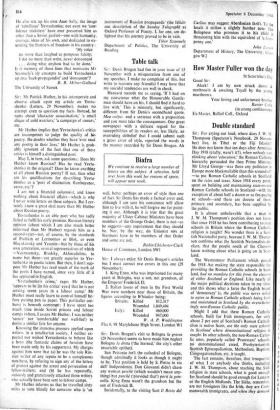Sir: Mr Patrick Hutber, in his intemperate and abusive attack
upon my article on Yevtu- shenko (Letters, 29 November), make no attempt even to question my facts. Instead, he rants about 'character assassination,' a small clique of cold warriors,"a campaign of smears,' etc.
Mr Hutber implies that Yevtushenko's critics are incompetent to judge the quality of his poetry. He doubts whether they have 'ever read any poetry in their lives.' Mr Hutber is prob- ably ignorant of the fact that one of these critics is himself a distinguished poet.
May I, in turn, ask some questions : Does Mr Hutber know Russian? Has he read Yevtu- shenko in the original? Does he know anything at all about Russian poetry? If not, then what are his qualifications for describing Yevtu- shenko as a 'poet of distinction, flamboyance, verve, etc.'?
I am not a financial columnist, and know nothing about financial affairs—which is why I never write letters on these subjects. But I cer- tainly know a great deal more than Mr Hutber about Russian poetry.
Yevtushenko is an able poet who has sadly failed to fulfil his early promise. Russian literary opinion (about which I am also much better informed than Mr Hutber) regards him as a second-rater—not, of course, by the standards of Pushkin or Lermontov or Blok, or even Mayakovsky and Yesenin—but by those of his own generation, several representatives of which —Voznesensky, Brodsky, Akhmadulina, to name but three—are greatly superior to Yev- tushenko in poetic talent. But then, I don't sup- pose Mr Hutber has read much of the work of the poets I have named, since very little of it has appeared in English.
'Yevtushenko's crime,' rages Mr Hutber, 'appears to be [in his critics' eyes] that he is not serving seven years in a labour camp.' Mr Hutber must really learn to control himself be- fore putting pen to paper. This particular out- burst is beneath contempt: I have spent too much time inside Soviet prisons and labour camps (where, I assure Mr Hutber, I was neither 'secure' nor 'comfortable' nor well-fed') to desire a similar fate for anyone.
Knowing the immense pressure applied upon writers in a totalitarian society, I neither ex- pected nor wished Yevtushenko to behave like a hero (the fantastic claims of heroism have been made only by his supporters). My charrs against him were that (a) he was the sole Rus- sian writer of any repute to be a conspicuous non-hero, by refusing to sign any of the letters of protest against the arrest and persecution of fellow-writers; and (b) he has repeatedly, viciously and gratuitously attacked those writers who actually have been sent to labour camps.
Mr Hutber informs us that he travelled sixty miles to vote blindly for someone who is 'an instrument of Russian propaganda' (the felicit- ous description of the Sunday Telegraph) as Oxford Professor of Poetry. I, for one, am de- lighted that his journey proved to be in vain.
Tibor Szamuely Department of Politics, The University of Reading


































 Previous page
Previous page